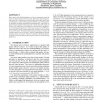Free Online Productivity Tools
i2Speak
i2Symbol
i2OCR
iTex2Img
iWeb2Print
iWeb2Shot
i2Type
iPdf2Split
iPdf2Merge
i2Bopomofo
i2Arabic
i2Style
i2Image
i2PDF
iLatex2Rtf
Sci2ools
ESE
2007
2007
An empirical study of cycles among classes in Java
Many authors have implied dependency cycles are widespread among the classes of object-oriented software systems. Proponents of the design principle Avoid cyclic dependencies among modules have argued such cycles are detrimental to certain software quality attributes (e.g., understandability, testability, reusability, buildability and maintainability). In this paper we present the first significant empirical study of cycles among the classes of 78 open- and closed-source Java applications. We find that, of the applications comprising enough classes to support such a cycle, around 45% have a cycle involving at least 100 classes and around 10% have a cycle involving at least 1000 classes. We present further empirical evidence to support the contention these cycles are not due to intrinsic interdependencies between particular classes in a domain. Finally, we attempt to gauge the refactoring burden to break all these cycles using the concept of a minimum edge feedback set.
Database | Dependency Cycles | ESE 2007 | Object-oriented Software Systems | Significant Empirical Study |
Related Content
| Added | 14 Dec 2010 |
| Updated | 14 Dec 2010 |
| Type | Journal |
| Year | 2007 |
| Where | ESE |
| Authors | Hayden Melton, Ewan D. Tempero |
Comments (0)

